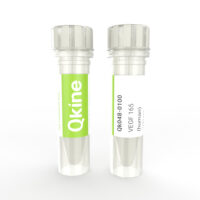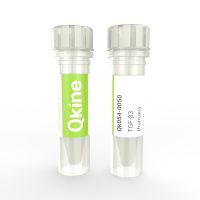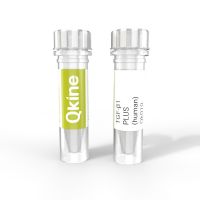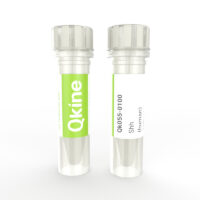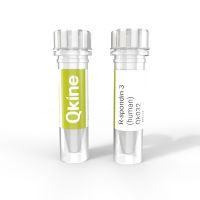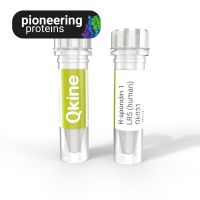- Recombinant human vascular endothelial growth factor 165 (also known as VEGF165/ VEGF-165/ VEGF-A/ VEGF165) protein is widely used in culturing primary endothelial cells, such as human umbilical vein endothelial cells.VEGF165 is commonly used with human-induced pluripotent stem cells or embryonic stem cells-derived endothelial cells for developing human vascular tissue models. It has many applications including its use in neural research involving oligodendrocyte precursor cells, Schwann cells, astrocytes, and microglia. It plays a role in bone formation, regulates mesenchymal stem cell differentiation, and serves as a survival factor for chondrocytes, hematopoietic stem cells, and tumor cells.Qkine recombinant human VEGF165 protein is a highly pure and potent 38 kDa homodimer, disulfide-linked consisting of two 165 amino acid polypeptide chains. It is an animal origin free (AOF) and carrier protein-free (CF) isoform of VEGF for high efficiency.
- Human TGF-β3 protein is a member of the Transforming Growth Factor family, a family involved in regulating cell survival, proliferation and differentiation.1 TGF-β3 is used in human pluripotent stem cell maintenance medias, such as B8 media.2 High purity and bioactivity for reproducible results. Human TGF-β3 protein dimer, animal-origin free (AOF) and carrier-protein free (CF).
- Transforming growth factor-beta 1 (TGF-β1) is a pleiotropic cytokine that regulates various cellular processes, including cell proliferation, growth, differentiation, motility, and apoptosis. It is an essential growth factor in many embryonic and induced pluripotent stem cell maintenance media, including the commonly used E8, StemPro, and mTeSR media. TGF-β1 also promotes the differentiation of various cell types such as fibroblasts, epithelial cells, and immune cells.Human/bovine/porcine recombinant TGF-β1 PLUS protein is the first entirely animal-free recombinant human TGF-β1 protein for highly reproducible results and compatible with chemically-defined stem cell media.TGF-β1 PLUS is a high purity 24 kDa dimer comprising optimized mature domain of TGFβ1 protein, animal-free (AF) and carrier-protein free (CF). Our TGF-β1 PLUS protein has been extensively tested for maintenance of iPSC pluripotency by the specialist stem cell biotechnology company, Stemnovate, Cambridge, UK.*Benchmark our TGF-β1 PLUS against your existing supplier*
- Sonic hedgehog protein (Shh) is a member of the Hedgehog family with an essential role in embryonic development, tissue regeneration, and tumorigenesis. Shh induces the cell fate and patterning of neural progenitors in ventral domains at various levels in the forebrain, midbrain, hindbrain, and spinal cord. It has many applications in the neural stem cell field where it plays a significant role in differentiating human-induced pluripotent stem cells (iPSC) towards motor neurons and interneurons. Also, it induces the patterning of organoids and embryos in culture.Recombinant Shh protein has a molecular weight of 19.8kDa. This protein is animal-free (AOF), carrier protein-free, and tag-free to ensure its purity with exceptional lot-to-lot consistency. Sonic hedgehog protein is suitable for the culture of reproducible and high-quality neurons and organoids.
- Human R-spondin 3 protein potentiates Wnt signalling in and has been shown to function in crypt regeneration in the intestine and control stem cell and progenitor cell behaviour during kidney development. R-spondin 3 is used alongside R-spondin 1 in intestinal organoid culture systems.17kDa highly pure, bioactive domain of human R-spondin 3 comprising the two cysteine-rich furin-like domains, which are necessary and sufficient for Wnt signalling potentiation and are the essential domains for activity in stem cell and organoid culture. Animal-free and carrier-protein free.
- Recombinant human r-spondin 1 LR5 protein is engineered to act as a high affinity ligand for the LGR5 receptor. In epithelial tissues LGR5 marks the stem cell population. This engineered protein, R-spondin 1 LR5, activates wnt signalling only in the LGR5+ stem cell population. R-spondin1 LR5 has been tested in intestinal organoid culture and supports organoid survival and growth. As LGR5 specifically marks stem cells and is not found on transit amplifying cells, the lower crypt multiplicity seen in organoid cultures with R-spondin 1 LR5 (in comparison to wild-type R-spondin 1, Qk006) supports the notion that this engineered form is acting specifically on stem cells. This specialized form of R-spondin 1 was developed in Marc de la Roche’s lab (University of Cambridge).
